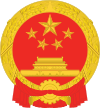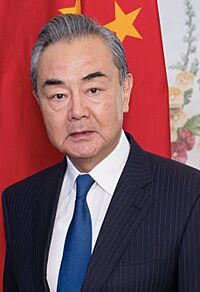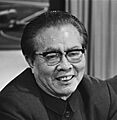Minister of Foreign Affairs (China) facts for kids
Quick facts for kids Minister of Foreign Affairs ofthe People's Republic of China |
|
|---|---|

|
|

National Emblem of the People's Republic of China
|
|
| Ministry of Foreign Affairs | |
| Member of | State Council |
| Reports to | Central Foreign Affairs Commission |
| Seat | Beijing |
| Nominator | Premier (chosen within the Chinese Communist Party) |
| Appointer | President
with the confirmation of the National People's Congress or its Standing Committee
|
| Precursor | Minister of Foreign Affairs of the Republic of China |
| Formation | 1 October 1949 |
| First holder | Zhou Enlai |
| Deputy | Vice Minister of Foreign Affairs |
| Minister of Foreign Affairs of the People's Republic of China | |||||||
|---|---|---|---|---|---|---|---|
| Simplified Chinese | 中华人民共和国外交部部长 | ||||||
|
|||||||
| Alternative Chinese name | |||||||
| Simplified Chinese | 外交部部长 | ||||||
|
|||||||
The Minister of Foreign Affairs of the People's Republic of China is like China's chief diplomat. This person leads the Ministry of Foreign Affairs, which is the government department that handles how China talks and works with other countries. It's one of the most important jobs in China's government, similar to a top position in a country's main team of leaders, called the cabinet.
The Minister is usually a member of the Central Committee of the Chinese Communist Party. This is a large group of very important leaders in China. The Minister is also often a state councillor, which means they are a high-ranking government official. The Minister of Foreign Affairs is the second most important diplomat in China. The top diplomat is the director of the Office of the Central Foreign Affairs Commission.
Contents
What is the Minister of Foreign Affairs?
The Minister of Foreign Affairs is the main person in charge of China's relationships with countries around the world. They represent China on the global stage. This includes discussing important issues, signing agreements, and making sure China's interests are protected. They work to build friendships and solve problems with other nations.
How the Minister is Chosen
The process for choosing the Minister of Foreign Affairs involves several steps. First, the Premier of the State Council suggests a person for the job. The Premier is the head of government in China. After the Premier suggests someone, the National People's Congress or its Standing Committee must approve the choice. The National People's Congress is China's highest state power. Finally, the President officially appoints the new Minister. The President is the head of state.
A Look at History
The job of Minister of Foreign Affairs was created on October 1, 1949. This was when the proclamation of the People's Republic of China happened, marking the start of modern China. The very first person to hold this important role was Zhou Enlai. He was also the Premier at the same time. This shows how important the role of foreign affairs was from the very beginning of the People's Republic of China.
Important Ministers Over Time
Many important people have served as China's Minister of Foreign Affairs. These individuals have played a key role in shaping China's relationships with other countries throughout history.
| No. | Portrait | Name (Birth–Death) |
Term of office | President | Premier | ||
|---|---|---|---|---|---|---|---|
| Took office | Left office | Term | |||||
| 1 |  |
Zhou Enlai 周恩来 (1898–1976) |
1 October 1949 | 11 February 1958 | 8 years, 133 days | Mao Zedong (since 1954) |
Himself |
| 11 |  |
Wang Yi 王毅 (born 1953) |
16 March 2013 | 30 December 2022 | 9 years, 289 days | Xi Jinping | Li Keqiang |
| 12 |  |
Qin Gang 秦刚 (born 1966) |
30 December 2022 | 25 July 2023 | 207 days | ||
| Li Qiang | |||||||
| 13 |  |
Wang Yi 王毅 (born 1953) |
25 July 2023 | Incumbent | 2 years, 34 days | ||
Images for kids
-
Chen Yi served as Minister from 1958 to 1972.
-
Huang Hua was Minister from 1976 to 1982.
-
Qian Qichen was Minister from 1988 to 1998.











